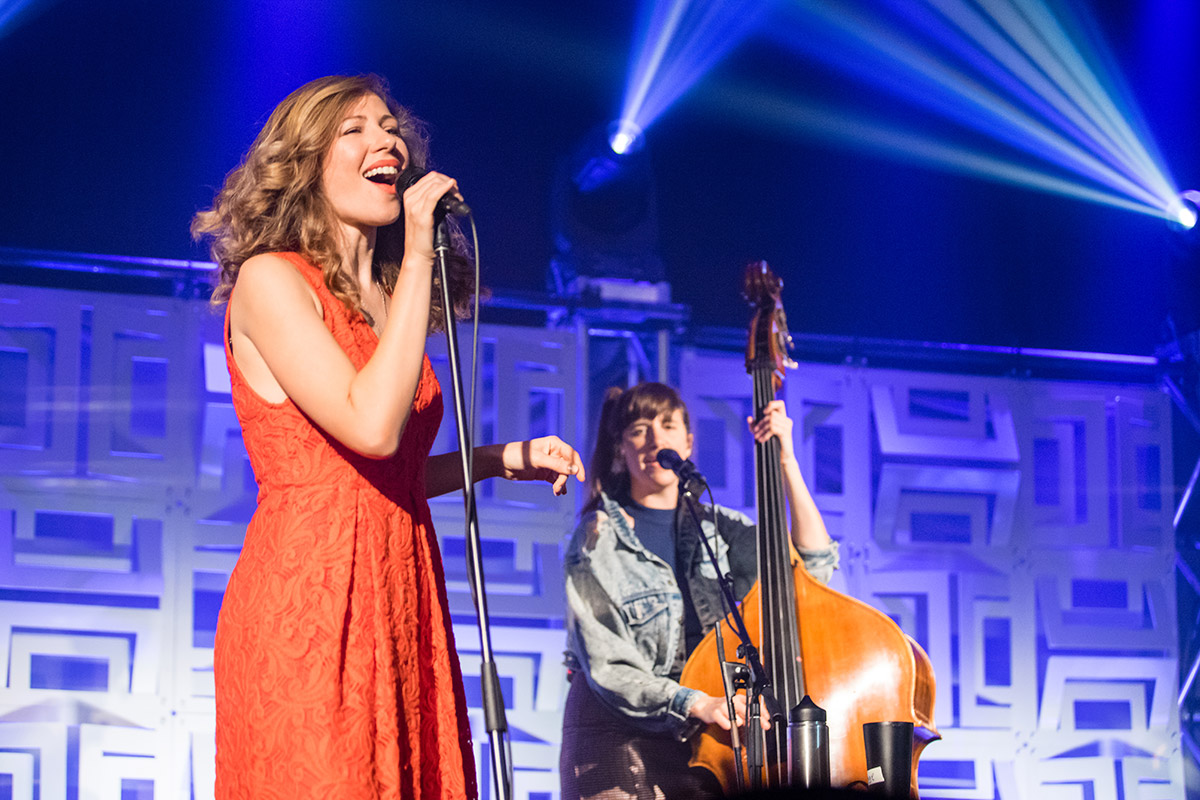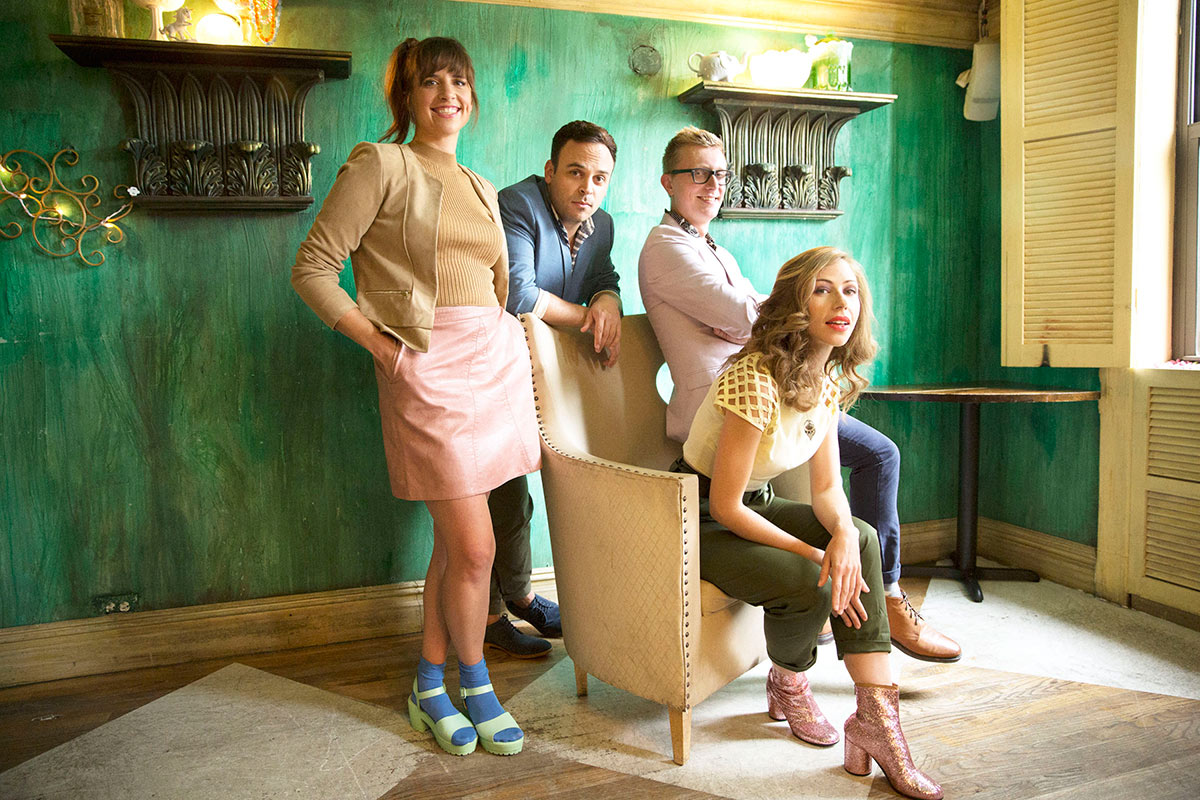Interview: Drummer Mike Calabrese of Lake Street Dive
On the new recording process for their album, Side Pony

Wearing his signature bandana headband, Lake Street Dive’s drummer Mike Calabrese keeps the beat and the energy going on stage at the Wiltern in Los Angeles. The sold-out crowd is more than game to sing along with the band. Moments later, they quiet down to marvel the power and artistry in Rachael Price’s voice and drink it all in: four skilled musicians who clearly enjoy being on stage together.
With Calabrese on drums, Bridget Kearney on upright bass, Michael “McDuck” Olson on trumpet and guitar and Price on lead vocals, this foursome knows how to show off their prodigious music chops. After all, they all met as students at New England Conservatory, studying jazz. The band started as a pet project of Olson, who thought it would be fun to form a country bar band—named after a street of seedy bars in his hometown, Minneapolis. Now more than a decade later with several solo projects and bands formed along the way, Lake Street Dive is their full-time focus. Having just released their new album Side Pony, a follow up to 2014’s Bad Self Portraits and marking their debut on Nonesuch Records, the band is in tour mode—one that culminates with an October show at NYC’s Radio City Music Hall.
Calabrese took time out from a series of southern California shows to talk to Cool Hunting about recording the new album, and how a chance find of some vintage vinyl influenced the sound of Side Pony: soul, R&B, ’60s rock with pop and shades of disco.

Side Pony was produced by Dave Cobb, who you were working with for the first time. How did he challenge you? How was recording this album with him different than how you have worked in the past?
We felt we had never captured the true live sound of the band. Maybe we had been able to capture the live sounds of the band, but it is a greater and more specific challenge to capture the live emotion of a performance. Dave was all about getting us in the same room and having us play together and focusing on the spontaneity of what we were doing.
How did the band react to recording in the same room?
In terms of recording, it was the first time since school that we had played acoustically in a room as a band. That’s what we had trained to do, but had not done in a while. It puts you on your toes a little more. You have to be really focused. There’s a not a lot of cleaning up you can do. As long as everyone does their job as best they can, you are going to get this really charged energetic performance. And that’s what he got out of us on this record. He was always striking the balance—you hadn’t played it this way before, so you get this freshness. It was like lightning in a bottle.

Another new part of the process was Dave Cobb asking you to bring in stripped-down demos rather than more completed ideas of songs. How did that change the way the band collaborates?
It speaks to the quality of the song. What he was looking for was, “Is this song good in the simplest form you can play it?” If so, when you guys play it as a band, it will be even better with that live energy. Then when we add something on top of it, it will stand stronger and sound that much more exciting.
Then Dave sent you out to go record shopping. What did he ask you to look for?
He literally said, “Find the dollar bin,” and choose the records based on the artwork of the cover. The weirder, the better. We got a bunch of records for a buck with ridiculous covers. And it turned out that some of them had choice inspiration on them. By and large they were ridiculous as a whole, but here and there were some cool elements that we took from.
“Can’t Stop” opens with a riff from one of those dollar bin finds. Who picked up the Major Lance album?
It was just one of a pile of 20 that we just [randomly] dropped the needle on. That [Major Lance] song “Love Pains” has this cool riff in it. David Cobb said, “Let’s sample that and write a song inspired by that.” It became the jumping-off point. All of the music we wrote around it, but did not take it from that song at all.
Were their other needle-drop discoveries that translated to a specific idea?
There was one record. I believe the artist was Mr. Dimples. The song was terrible, but the band had captured this groove that was really awesome. That is the groove we ended up using for “Side Pony,” the song. We play it in our way and put one of our songs on top of it.

All four of you write music for the band. Can you talk about a song on Side Pony that you wrote the original idea and what process it went though to the final recorded version?
I brought in “I Don’t Care About You” and “Close to Me.” With “Close to Me” I played it for Dave and he said, “It is pretty much all there, but the way you end the choruses isn’t quite strong.” They end with the lyric, “Leave me alone.” He said, “Just repeat that line and have that be the end of the chorus.” And we tried it out and were like, “Oh my God!” For the longest time, I wasn’t super-into that part of the song and I couldn’t quite tell why. And he fixed it in five minutes. That’s something a producer does that is really awesome. He takes what you have, leaves it intact, and reshuffles the ideas that are already there. It was such a simple fix. I think that is very symbolic. Sometimes the best answers are the simplest ones, but also the hardest to come up with.
When recording and touring how does the band approach balancing out the four of you to each have your own identity?
Each of us has room to move. We can simultaneously be supports but also have an identity. That’s why we love playing in the band. People say they love coming to the live shows and seeing our chemistry. I think it is at the root of why we stay together. Rachael’s voice, it’s a feature of our band. But at the same time, there is so much space because it is only the four of us. It allows the characters to come through more. She inspires us and our characters as players inspires her. That’s the whole point. Being a drummer, I am supporting the singer.
Who are you listening to now? What is in heavy rotation on your playlist?
Since last year, I kept going back to D’Angelo’s Black Messiah, which is a staggering work. His aesthetic and his singing, the way his band plays encapsulates everything I love about rock and soul music and the way people perform. It is very visceral and very lizard-brained on one end of things. On the other end of things, it is incredibly meticulous. It is put together with so much detail and care. I consider D’Angelo a genius.

The Side Pony Tour will end with a show at Radio City Music Hall. How did Lake Street Dive get to this point?
None of us knew it would become what it is. What kept us doing it? We like hanging out with each other from the get-go. We have shared values and interests. We never did it for image or to try to get famous, or even for money for the first six years. We did it for fun. It keeps you doing it. You look for things that keep you doing it. A reason to come back. A reason to suffer for it. There is a lot of struggle involved. It’s got to be fun.
Neptune Theatre, Seattle 3 March show images courtesy of Alexander Hallett, Sattva Photo; band portrait courtesy of Danny Clinch












